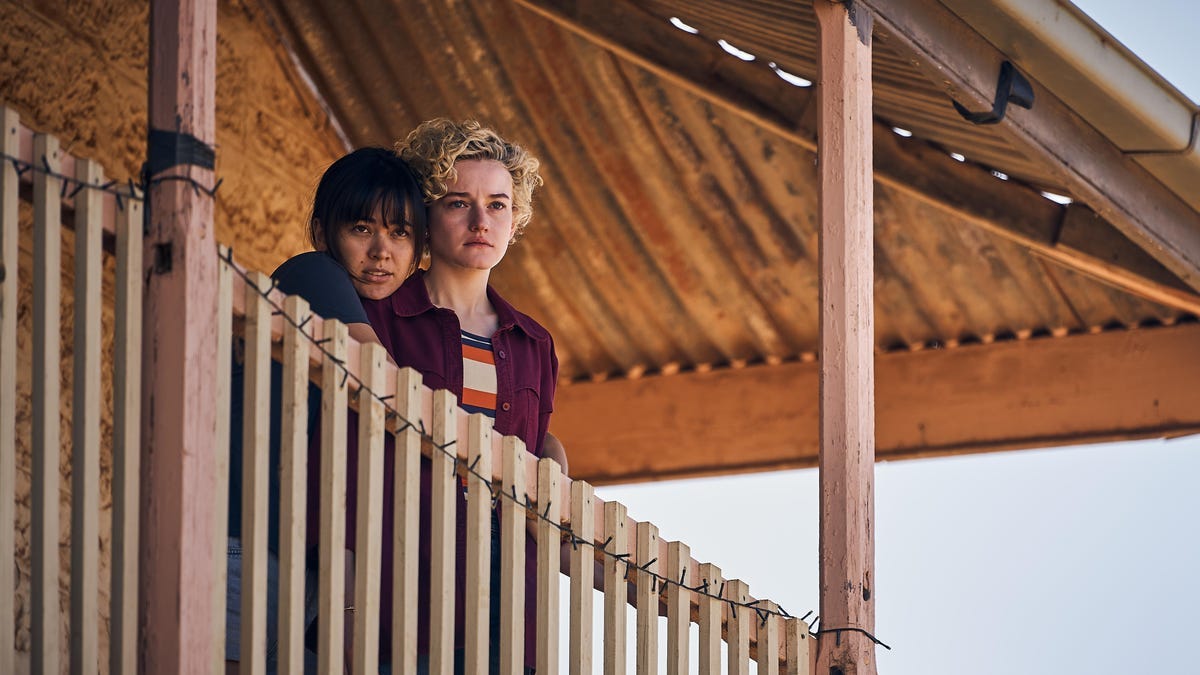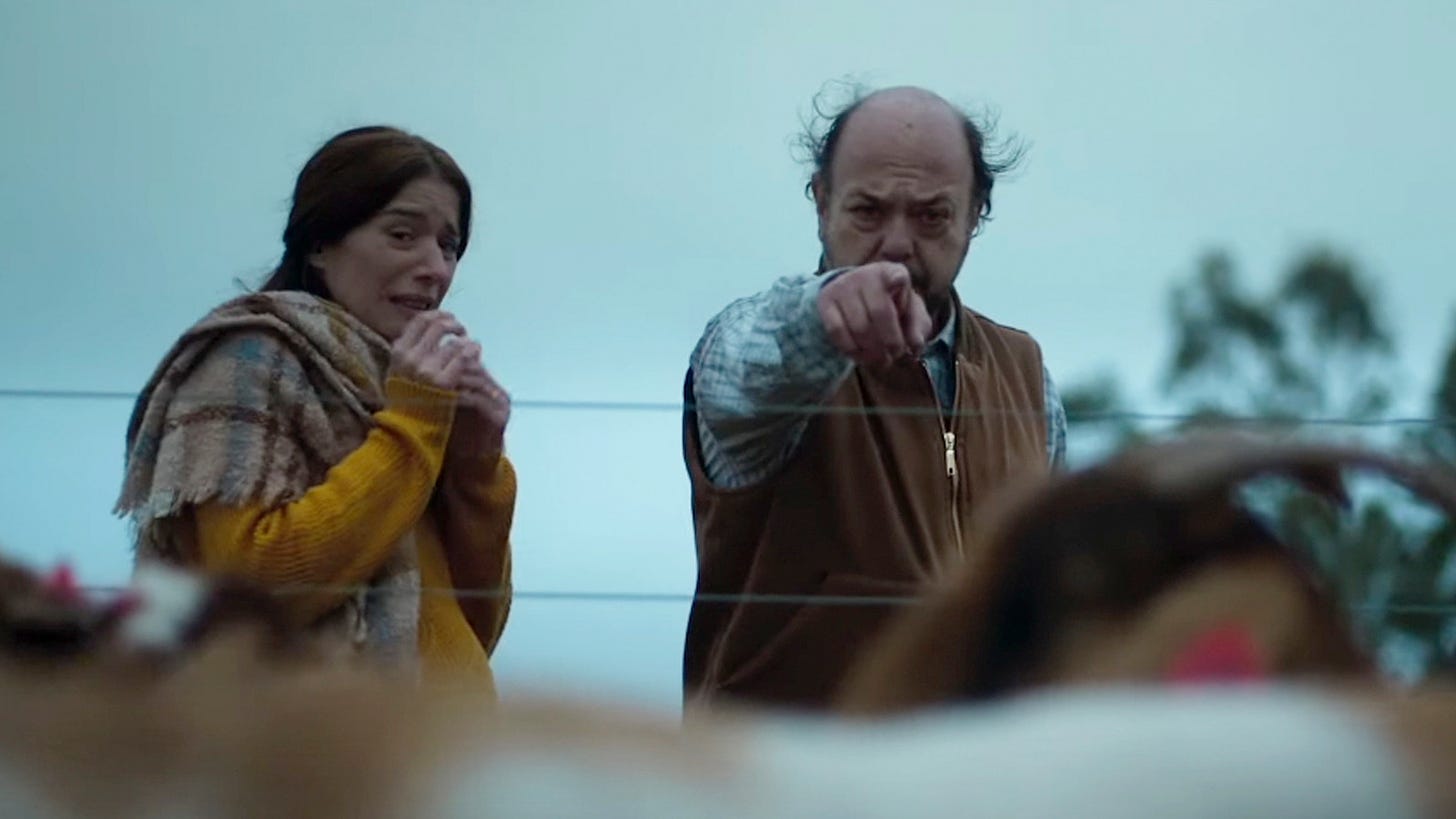In Review: 'The Royal Hotel,' 'When Evil Lurks'
'The Assistant' director Kitty Green follows up with another story of working women under duress and an Argentinian shocker pulls a twist on the demon possession movie.
The Royal Hotel
Dir. Kitty Green
91 min.
The brilliance of Kitty Green’s previous feature, The Assistant, is in how it approaches a famous case of sexual harassment and abuse through the side door, focusing on the assistant to a Harvey Weinstein-like film industry boss without even showing him on screen. What might that environment be like, particularly for a powerless young woman who wants to get a foothold in the business? How does that top-down toxicity infect the rest of the office, from producers to prospective talent to the human resources department? What’s a conscientious and legitimately fearful person to do? What choices does she have?
Green made the audacious choice to let those questions sit around and slowly curdle, like milk on the radiator. The single scene in which her heroine, played beautifully by Julia Garner, takes action results in such a startling rebuke by the HR guy that no other big scene is necessary. And now Green, working with Garner again, has pulled off a companion piece of sorts with The Royal Hotel, only here the toxic workplace is a roughneck bar in the Australian Outback and Garner plays one of two powerless young women who have to figure out how to navigate their time there. Once again, Green isn’t interested in explicit violence per se, though the terror is certainly amplified here. She cares more about implicit threats and the psychological wear-and-tear they can have on women. She’s made a Wake in Fright of godawful vibes.
“Smart cunt, huh? Think you’re a smart cunt. I like that. We could use that around here.”
This is the first conversation Hanna (Garner), an American backpacker waylaid in Australia with her friend Liv (Jessica Henwick), has with their new boss Billy (Hugo Weaving), the alcoholic proprietor of The Royal Hotel, where they’ve taken temporary jobs as bartenders. Hanna is astonished to be called “the c-word” by way of introduction, but walking right back out the door isn’t the clearest option—or even one available to them. For one, Hanna and Liv are flat broke, which is why they’ve agreed to pause their vacation and take a well-paying gig with the understanding that things might get a little colorful. They’re also not sure whether Billy intends to be hostile and offensive or whether he’s just being a little salty. Hanna and Liv will be puzzling over the same concerns about nearly every other man they encounter.
Like many a global adventure for impulsive twentysomethings, Hanna and Liv’s plans are upended with the swiftness of a credit card swipe. And so with the promise of cash payment and a limited commitment, they embark on a train and bus ride to the Royal Hotel, where they clock in just as a couple of hard-partying British women are clocking out. Their accommodations above the bar are rustic (to put it kindly), their boss is a drunken lout, and the clientele is mostly rowdy local miners who have come to blow off steam. The trick is to figure out which ones are affable guys who will tell the occasional off-color joke and which ones are potentially dangerous.
Inspired by the documentary Hotel Coolgardie, Green carefully evokes something close to the Outback of Wake In Fright, but as regionally specific as The Royal Hotel feels to her native Australia, the film works as a bracing companion piece to The Assistant, in that it’s more generally about women operating in a man’s world. If they’re not down to party—as their British predecessors were, or as Liv attempts to be—then they’re “sour cunts” who are driving away business. Yet they are on vacation, too, and want to eke out whatever pleasure they can find, which of course makes them more vulnerable than locking themselves into their quarters at this seedy base of operations.
Green puts the audience in Hanna and Liv’s predicament, but isn’t in any hurry to get them out of it. And why should she be, when assessing danger is such a vexing proposition? The Royal Hotel may put them in an extreme position, but it’s not uncommon for women to have to think about their safety and feel thoroughly walled-in by it. The one disappointment with the film is that Green and her co-writer, Oscar Redding, cannot imagine a more innovative way out of the mess they create. But like Hanna and Liv, they can only contain a combustible situation for so long. —Scott Tobias
The Royal Hotel opens tomorrow in limited release.
When Evil Lurks
Dir. Demián Rugna
99 min.
Last week, when revisiting Saw, I wrote about the “red meat” thrown to the ravenous audiences at Midnight Madness during the Toronto Film Festival. I was not at the festival this year—and likely wouldn’t have been attending Midnight Madness screenings anyway, given my age and quick-turnaround deadlines—but Demián Rugna’s demon possession movie When Evil Lurks was part of this year’s slate and can say with some confidence that everyone there increased their risk of type 2 diabetes, coronary heart disease and colorectal cancer. Because they surely ate this deranged, outrageously gruesome Argentinian nonsense up.
In the countryside surrounding a small town in Argentina, a fearsome pestilence called “the rotten,” more or less Evil incarnate, threatens a handful of locals at a minimum and many more if it’s not handled as tradition dictates. The responsible thing to do is also counterintuitive: it must be contained and tended-to in a home without electricity until a state-sanctioned “cleaner” can take care of it. But when two brothers, Pedro (Ezequiel Rodríguez) and Jimmy (Damian Salomon) discover the cleaner decapitated in the woods, they rope a local landowner (Luis Dzimbrowski) into taking more drastic measures. “The rotten” at this point is an obese, oozing, boil-covered man who’s begging for mercy, but the trio commit several grave errors at once by driving his body out of town and trying to dispose of it. And then more important rules get violated.
When the film is really cooking, Rugna turns these mistakes into the sort of black comedy Sam Raimi might direct, with spasms of supernatural gore prompted by macho arrogance and mystical hokum. Rugna isn’t afraid to bring children and dogs into the mayhem, and a long sequence where Pedro tries to wrest his kids away from his embittered ex-wife and peel out of town turns into a near-farcical display of zombie-movie mishaps. Though the many rules involved in dealing with “the rotten” are unknown to us as an audience until they’re revealed, Pedro and his brother should be aware of them, which adds an element of incredulity on the part of other locals that’s over-the-top and funny. Why would they make this terrible situation so much worse?!
And oh my, does it get bad. When Evil Lurks eventually settles into a more conventionally terrifying demon possession thriller once the brothers join forces with a woman who knows what she’s doing, even though it might be too late. It also delivers some creepy images around a children’s hospital that the evil finds particularly inviting. Yet When Evil Lurks never quite reaches the fever pitch of its most frantic moments, when we don’t understand what’s happening beyond realizing that these brothers don’t have any smart answers, either. For them, the task of holding back a force that could threaten the globe is a literal shot in the dark. — Scott Tobias
When Evil Lurks opens in limited release tomorrow. It streams on Shudder starting October 27th.








Why no EXORCIST: BELIEVER review? Funny story: I went to a screening of that movie at one of Chicago's less competent multiplexes that had to be shut down because of sound issues. Having seen the first twenty minutes without audible dialogue, twice, I can report back that the beaches of Haiti looks lovely, but little beyond that.
I'm gonna put this here because you mentioned it twice but I got assigned to review Wake in Fright on a re-release a while back, having never heard of it. It was fantastic, but I felt like I needed to take about three showers afterwards.